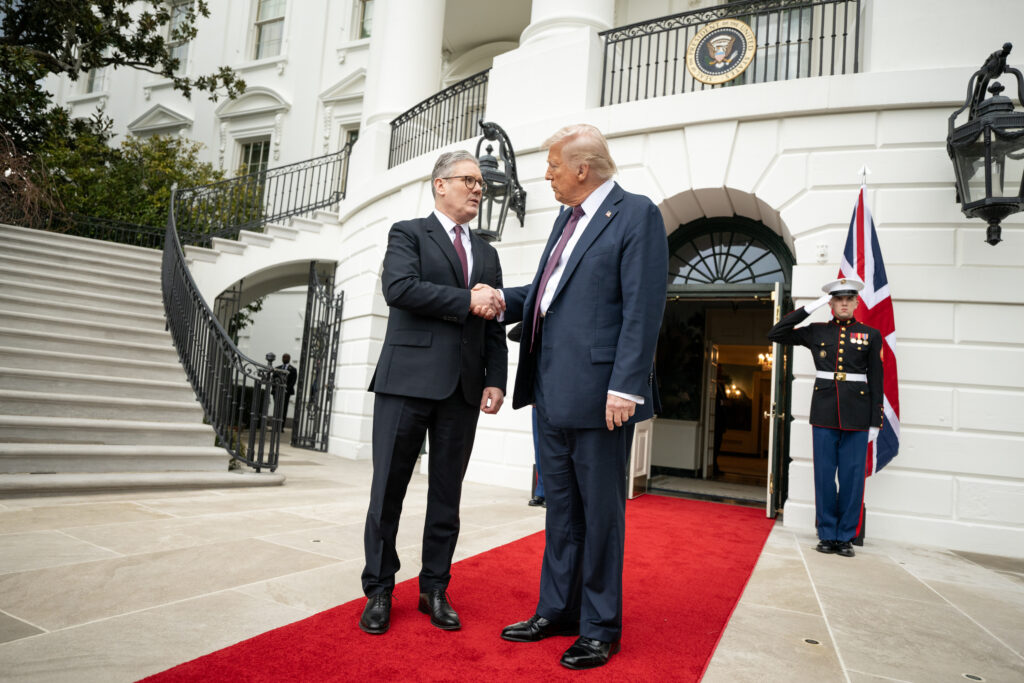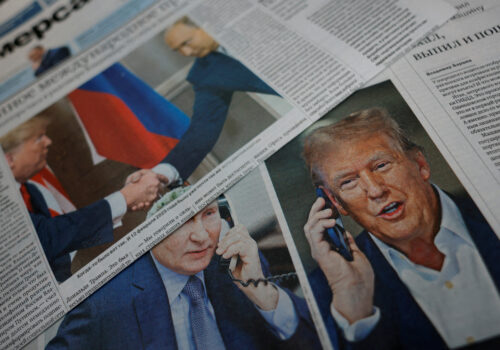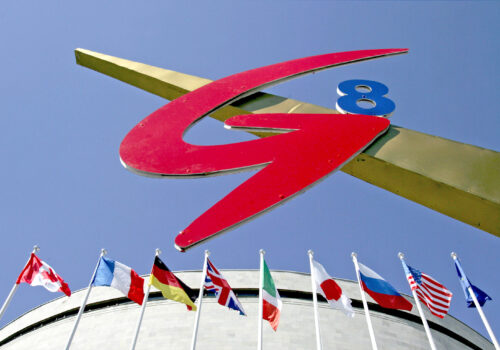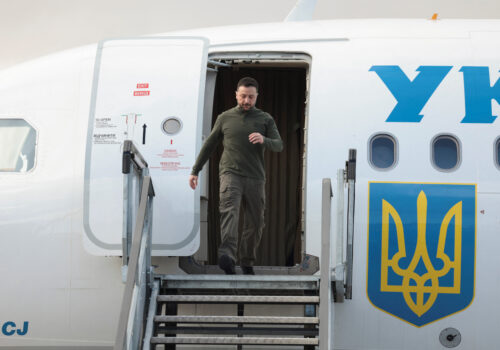Following French President Emmanuel Macron’s White House visit on Monday, on Thursday it was British Prime Minister Keir Starmer’s turn to make the case directly to President Donald Trump for continued US engagement in transatlantic security. Friday’s visit by Ukrainian President Volodymyr Zelenskyy to sign a deal on Ukrainian minerals caps a head-spinning few weeks of transatlantic diplomacy.
For Starmer, his visit is an early make-or-break moment for his young administration. Starmer won a convincing majority in July 2024, ushering in the first Labour government since 2010.
But since then, his polling numbers have slid consistently following a short honeymoon that was abruptly ended by far-right riots in the summer, and a persistently gloomy economic outlook combined with unpopular cuts to the government’s winter fuel allowance program for pensioners.
Some of the early criticism of his government has been that it lacks a defining purpose beyond the generic ambition of economic growth. The accelerated reimagining of Europe’s security architecture, and the need to find a leader for the moment, could provide Starmer with the opportunity to redefine his premiership and establish himself as a genuine statesman.
Cue historical comparisons to Starmer’s conservative predecessor Margaret Thatcher. Thatcher also struggled with low popularity and a sluggish economy in her early years in power. But then Argentina invaded the Falkland Islands, Thatcher responded decisively, and she never looked back.
The current national security crisis Starmer faces is more chronic and complex than the limited nature of the Falklands crisis. For Starmer to meet the moment, he will need to succeed on three fronts.
First, Starmer must make himself an indispensable bridge to Europe for the Trump administration. This has been a role British prime ministers have played in the past (most overtly Tony Blair during the George W. Bush administration). But doing so requires a personal chemistry between the leaders that matches the close historical and institutional ties between the White House and Downing Street.
Second, Starmer should move beyond the difficulties in the post-Brexit relationship with Europe and show that the United Kingdom can once again be a leader in Europe in difficult times. UK defense ties with the rest of Europe, largely free of the political baggage that created the conditions for Brexit, provide the United Kingdom with the best route back to a stronger relationship with Europe.
And finally, after decades of underinvestment, Starmer needs to take the tough domestic policy decisions needed to reestablish the UK military as an elite deterrent force, supported by a defense industry that can provide the necessary equipment and armaments.
Starmer has been busy across all three fronts this week.
On the first point, this week’s meeting at the White House appears to be a success. On the surface, Trump and Starmer are two politicians cut from very different cloth. Trump’s friendship with Starmer’s domestic political rival Nigel Farage, billionaire Trump adviser Elon Musk’s trolling of Starmer over the summer riots, and a record of less flattering comments about Trump by senior Labour figures could have been impediments to a positive relationship. But Starmer has been intentional with his charm offensive, including calling Trump hours after the failed assassination attempt in July 2024, and visiting him at Trump Tower and Mar-a-Lago in recent months. Starmer’s relative lack of ego, as world leaders go, has allowed him to play a difficult diplomatic hand well so far.
Starmer flies back to London and will immediately set about the work of galvanizing his European counterparts.
Thursday’s White House meeting was a much higher-stakes occasion. Nevertheless, the body language was relaxed—a contrast to the awkward hand-holding of then British Prime Minister Theresa May’s first encounter with Trump, or the macho tug-of-war that has come to characterize the Trump-Macron relationship. The prime minister began by handing the president a letter from King Charles, inviting the president and first lady to an “unprecedented” second state visit. For Trump, this kind of diplomatic gesture matters, and it set the tone for a warm and positive encounter. Trump praised Starmer’s negotiating skills and indicated that the United Kingdom would be spared tariffs and instead rewarded with a trade deal. While he didn’t commit to hard security guarantees for Ukraine, Trump nevertheless expressed the kind of support for NATO and Article 5 that European allies are desperate to hear right now.
Starmer flies back to London and will immediately set about the work of galvanizing his European counterparts. On Sunday, he will host a summit of European leaders to debrief on the visit and strategize next steps in support of Ukraine and to deter further Russian aggression on the continent. The evident close coordination with Paris both before and after these visits is encouraging, necessary, and not something that was a given over the past decade.
It’s the final challenge that Starmer faces—the need to revitalize the UK military—that will be by far the toughest. Starmer laid the groundwork for this week’s visit by announcing a British willingness to commit boots on the ground in Ukraine as part of a peace settlement. And he announced to Parliament that the United Kingdom would raise defense spending as a percentage of gross domestic product from 2.3 percent today to 2.5 percent by 2027, rising to 3 percent after 2029.
But making the spending announcement is the easy part. Following through with the money will be tricky. The initial funding will be siphoned from the United Kingdom’s aid budget, disappointing many Labour supporters, hurting the United Kingdom’s soft power standing on the world stage, and prompting the resignation of the United Kingdom’s international development minister. Further money will need to come either from tax rises, spending cuts, or loosened borrowing, all of which come with political peril and will need the blessing of the chancellor of the exchequer, Rachel Reeves. How that money is spent, with the various needs of reversing a generational recruitment problem, uplifting the defense industrial base, and adapting to the battlefields of the future, will be a complicated exercise.
This week has been a diplomatic success for the prime minister. But it is only the initial stage of a reconfigured defense and security policy. Many years and billions more pounds will be needed before Starmer can claim a political legacy on its success. The Falklands War was won in the space of seventy-four days. Starmer will have to be more patient.
Philippe Dickinson is a deputy director with the Transatlantic Security Initiative (TSI) at the Atlantic Council’s Scowcroft Center for Strategy and Security. Prior to joining the Council, he was a career diplomat with the United Kingdom’s Foreign, Commonwealth and Development Office.
Further reading
Thu, Feb 20, 2025
What Europeans think of Trump’s approach to Ukraine (and what they might do next)
New Atlanticist By
European leaders are waking up to calls from the Trump administration to take the lead on security for Ukraine. Atlantic Council experts share what that might look like from Berlin to Vilnius.
Fri, Feb 28, 2025
To rejoin the G7, Russia should meet several important conditions
New Atlanticist By
To rejoin the G7, Russia must meet strict conditions, including making significant concessions for a just and lasting peace in Ukraine.
Thu, Feb 27, 2025
Dispatch from Kyiv: The Trump-Zelenskyy meeting signals a momentum shift in Ukraine’s favor
New Atlanticist By John E. Herbst
The Ukrainian president’s visit to the White House on Friday highlights just how far events have moved over the past two weeks.
Image: President Donald Trump and U.K. Prime Minister Keir Starmer participate in a joint press conference, Thursday, February 27, 2025, in the East Room of the White House. (Official White House Photo by Daniel Torok)



